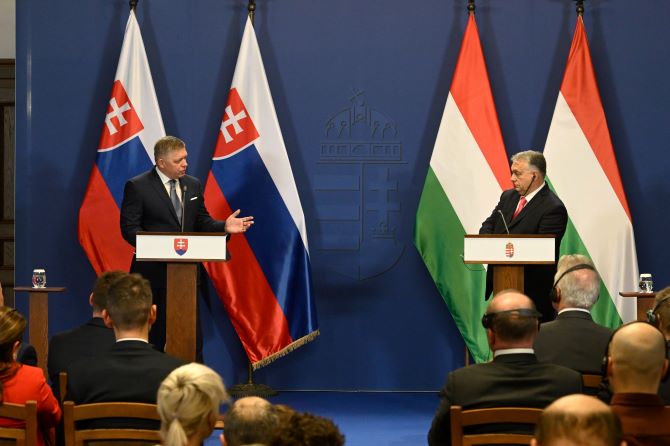Slovak and Hungarian Prime Ministers Robert Fico and Victor Orbán are agreed that a European Union plan to provide financial assistance to Ukraine should be reframed. Slovakia’s concurrence serves to endorse last month’s veto by Orbán of EU efforts to approve the funding. It comes just days after demonstrations in Slovakia against Fico’s overhaul of the country’s justice system.
When the two leaders met in Budapest on Tuesday, Fico told a joint press conference that, like Orbán, he agreed the EU should not finance a planned 50 billion euro aid package for Ukraine from the bloc’s common budget. He made clear that he shared Orbán’s view that the war in Ukraine could not be resolved militarily.
Highlighting the bond between the two countries in his remarks to the press, Orbán cited the value each places on its sovereignty. Neither, he said, is happy about the kind of overriding initiatives stemming from Brussels, including its efforts to legitimise illegal migration. Fico echoed his counterpart’s sentiments, calling Orbán’s proposals for a review of the EU budget and aid to Ukraine “rational and sensible.”
The bloc has withheld billions in funding from Budapest over concerns that Orbán’s government has cracked down on judicial independence, media freedom and the rights of the LGBTQ+ community.
Some critics in the EU maintain Orbán used his veto power over assistance to Ukraine in order to leverage access to these frozen funds. According to Fico, the withholding of these funds was sufficient justification for Orbán to oppose EU funding for Ukraine. Many of the bloc’s leaders who were aiming to provide Kyiv with a consistent cash flow for the next four years were reportedly angered by the move. Unanimity is required for decisions affecting the EU budget, and Orbán was the only one of the bloc’s 27 leaders to vote against the funding.
Last week, a cross-coalition group of 120 EU lawmakers signed a petition urging that Hungary be stripped of its voting rights in the bloc’s decision making, maintaining that Orbán had repeatedly violated EU values by subverting democratic institutions since taking office in 2010.
When EU leaders meet again as expected on 1 February in a bid to conclude the financial package, Orbán’s veto power will again be a factor.
Given that Orbán is increasingly isolated in Brussels, Fico, who won Slovakia’s September elections on a pro-Russian, anti-US platform, could prove to be an important ally in the former’s ongoing disputes with the EU. However, while the two leaders may agree on such issues as migration, anti-LGBTI or Islamophobia, analysts suggest that the Slovak Prime Minister, all too aware of what has happened vis-a-vis the rule of law in Poland and Hungary, will adopt a more pragmatic approach in his dealings with the EU and seek to avoid an outright confrontation with Brussels.

